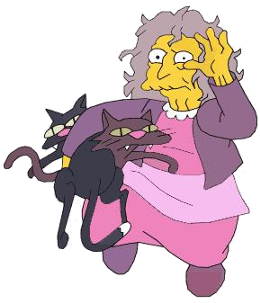Overreliance on imagination and obsessive-compulsive disorder
 |
wegotthiscovered.com
Tony Shalhoub as Adrian Monk, a San Francisco detective who suffers obsessive compulsive disorder, created by writer and producer Andy Breckman. |
The television detective Monk was an enjoyable character, solving crime despite being portrayed as being nearly crippled by his obsessive compulsive disorder. What attribute of the Monk character made him effective at solving crime? Or rather, what attribute might the writers have picked up on that made him able to solve crimes that baffled others?
As this research points out it was his imagination. He was obsessive because he could imagine the germs on every door knob and so on, so he had a well developed ability to picture "what-ifs." This in turn gave him the ability to imagine all sorts of possible solutions that those of us lacking a hyper-imagination would miss.
I don't know that this was the writer's thought process, but it came through in Monk's thought processes.
Here's the story with a link to the full report in the attribution.
* * * * *
Over-reliance on imagination may be
a sign of obsessive-compulsive disorder
Confusing reality with imagination and losing contact with reality are two key characteristics that could play a role in the development of obsessive-compulsive disorder (OCD). This is what we learn from a study conducted by researchers at the CIUSSS de l'Est-de-l'Île-de-Montréal (Institut universitaire en santé mentale de Montréal) and the University of Montreal, the results of which were published in the Journal of Clinical Psychology.
"In general, researchers agree on the diagnostic criteria of OCD. However, there is no consensus on the mechanisms underlying them," said Frederick Aardema, co-director of the Obsessive-Compulsive and Tic Disorder Studies Centre (CETOCT).
Already in 2011, the CETOCT team had observed that people who rely heavily on their imagination and have a strong tendency to dissociate from reality had more obsessive symptoms. The aim of the study was to confirm these observations in a population with OCD.
"Theories about OCD stipulate that it is not the content of thought that is involved in the development of obsessions but the way these thoughts are interpreted by the person," added Aardema, assistant professor in the University of Montreal's Department of Psychiatry. "While most people will dismiss an idea if they feel it has no meaning, people with OCD will say that if they think that way they must be a reason"
Method
The researchers asked 75 people with OCD to complete questionnaires assessing inferential confusion, schizotypal personality, dissociative experiences, strength of obsessive beliefs, and depressive and anxiety symptoms.
"First, inferential confusion is a reasoning process in which obsessive doubt takes hold. Individuals make subjective connections between different elements," explained Stella-Marie Paradisis, a doctoral student in psychology at the University of Montreal and lead author of the study. "For example, the person believes that the water in a municipal swimming pool is contaminated because chlorine has been put into it, so inevitably there are bacteria in the water.
Second, schizotypical personality* is characterized by bizarre ideas, rigid belief, lack of discernment, and a tendency to over-rely on imagination. For example, individuals are convinced that what they hear on the news or read in the newspaper concerns them personally and directly.
Finally, dissociation is characterized by loss of contact with reality and memory lapses in certain situations -- a phenomenon that can be observed especially in people who display checking behavior. Some people feel that they can behave so differently depending on the situation that they are two different people."
Results
The results of the CETOCT team highlight the important role of inferential confusion and dissociative experiences, which are signs that best predict OCD symptoms. "It seems that people with OCD are so absorbed by their obsession due to inferential confusion that there is a break with reality," explained Professor Aardema. "Specifically, we found that individuals no longer rely on their sensory perceptions or common sense but on their imagination. For example, they are afraid that their hands are contaminated with germs, so they wash them over and over again because they are convinced that their hands are dirty even though they are visibly clean," concluded the researcher.
Other factors such as anxiety and depressive symptoms, schizotypal personality, and obsessive beliefs do not seem to play a significant role in the development of OCD symptoms but in the severity of the disorder.
* Schizotypal Personality Disorder Schizotypal personality disorder is characterized by someone who has great difficulty in establishing and maintaining close relationships with others. A person with schizotypal personality disorder may have extreme discomfort with such relationships, and therefore have less of a capacity for them. Someone with this disorder usually has cognitive or perceptual distortions as well as eccentricities in their everyday behavior. ~ Psych Central Staff, psychcentral.com
Related stories:
- A Link Between Writers, Schizophrenia and Suicide?
- Can narcissists learn empathy? Yes, according to the latest research.
- Change, Conflict Cue Memories of Life's Milestones
- Could Depression be Infectious? One Researcher Says Yes.
- Developing Characters Who Believe in Pure Evil
- Developing the Socially Anxious Character
- Developing Your Addicted Character ~ The Gambler
- Eye Contact May Tell You How Neurotic Someone Is
- Hallucinations and Delusions More Common than Thought
- Internet Addicts Often Suffer Depression and Other Disorders
- Mental Illness Less Likely to Lead to Violence than Drugs, Rage or Access to Guns
- Mood Instability and Your Characters
- Over-reliance on imagination and obsessive-compulsive disorder
- Parent's Suicide Attempts Increases Suicide Risk in Their Children
- Personality, Situation and the Writer
- The Simpsons Crazy Cat Lady and Her Psychiatric Illness
- Sitting, Sloth & Toole's A Confederacy of Dunces
- Suicide Rates for Older Adults Up 40%
- Your depressed character: Chewing the cud of shame & guilt
- Your worried character who lives in the past

Comments
Post a Comment